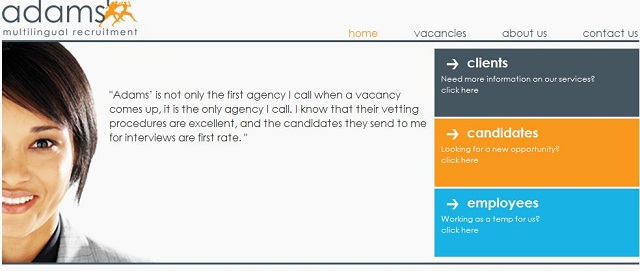
The Netherlands ranks high as a proper place where to start a company. What do you find are the advantages of setting a business here?
When I came to the Netherlands, in 1991, there was a time of recession. So I did not set up a business because it was easy to do so, but because I saw a gap in the market, which was for international recruitment companies. I had always worked in recruitment, and I noticed Holland was not very international back then. It was not easy to set the company, as Holland has a lot of rules and regulations, and you may often need advice to get through the paperwork.
Over the last twenty years that I have been in the Netherlands things have changed a lot, especially with regard to international community. The main advantage of setting up a business here is that many of services that government bodies offer are in English and there are a lot of companies that specialize in offering help to expats wanting to set up a business.
How did you personally experience integrating in the Dutch society?
I found it quite difficult. I think the first barrier to overcome is the language, and that makes it difficult for most foreigners. Once I mastered the language , life became a lot easier. I do think it is easy to come here as a foreigner, Holland has become so much more international, it changed to accommodate and attract people. So my tip for everybody is to learn the language.
What is the specific approach towards recruitment at Adam’s Multilingual? How are contacts with companies and candidates established and maintained?
One of the reasons I set up my business was because I think the service is really important, both to candidates and clients. When I came to Holland and was looking for a job, I felt that service to candidates was not that great. I’ve worked in recruitment for 30 years, also in London and Hong Kong, which are really service-orientated places. So when I started my company I wanted to offer a good service not just to companies, but also to candidates.
What we do for candidates is we listen and try to help them, we want to know what they want, what their priorities are, and we try to advise them. Only then we have spoken to the candidates do we present them to our clients. On the client side, we can’t always find the candidates that they are looking for, but we keep the lines of communication open and have an honest and transparent relationship with them. Quality is really what we go for.
What challenges did you encounter over the past 20 years of owning a recruitment agency in Holland and how did you deal with those challenges?
The challenge in the beginning was operating as a foreigner, as a non-Dutch speaking person in a bureaucratic country, with all the paperwork to be done and no Internet. Nonetheless, it was a great time to start, an easy market, as there were not many international recruitment companies established. My business had an amazing growth in the first years.
It was only a few years ago that the expat world became so important on the government agenda, and now a lot of information is available, such as expat centers, places we can refer people to. In the beginning we had to also function as an information source.
Challenges were then the recession in 2001, the Internet bubble, when we had to change our client mix, and the current recession. A recession always affects your business, because you have to look at how you do your business, and how you can do to do it more effectively.
The next challenge for recruitment is how to move with the advent of social media, how to use this platform effectively. We all have our websites, we all have our facebook accounts, we use LinkedIn, and twitters is now coming, but you’re also dealing with a group of clients who don’t always have the time and interest in social media, while candidates, who are young, are already using it. We as a company are starting to invest time and money in social media , because we believe that to be the future, but we have to be aware that not all our target audience is there yet.
Which industries and functional areas have a greater demand for international professionals and which sectors are at the moment struggling?
The IT and telecommunications are always very international, and what we also find is a lot of manufacturing companies that manufacture outside of The Netherlands, but have a shared service center here, and that can be finance, customer service, human resources. The advantage of Holland is that it has a well-educated population, and a very international one as well. For example, there is a big demand at the moment for international finance people. What is also taking off is the fashion industry, and that is also very international.
As companies reduce their costs during the recession, one area that is affected is marketing.
What is the balance between permanent and temporary contracts offered to international workers?
Normally, our split is about 50-50. Temporary contracts have the advantage of offering flexibility to the employer. But, since January 2012, especially in the Amsterdam area, we do not really know the reason, most candidates received a direct, contract with the clients.
How would you advise expats looking for work or for a career change in The Netherlands to best go about their search?
Firstly, learning Dutch makes your life easier here, socially, but until you read and write fluently , it is difficult to actually use it in work-related situations.
Also, we get a lot of emails in which people attach a CV and just write two lines, which is a terrible way to apply for a job. I think people don’t take the time anymore to really explain what they’re looking for. Or people send CVs with spelling or grammatical mistakes, and that is a really bad start. Your CV is the most important tool for selling yourself, and by being sloppy you’re not doing yourself any favours. Especially when you apply directly to a company. As an intermediating agency we can be more forgiving, but when you write to a company you need to make sure you have a good email cover, the motivation letter should not be too long, and you CV must be accurate. Also, don’t just apply to any job, but take the time to see if you could really do the job.
Networking is also very important, especially on social networking sites such as Linked In. There are however hidden dangers with social networks, as many HR professionals check the Facebook accounts of candidates they are considering.

